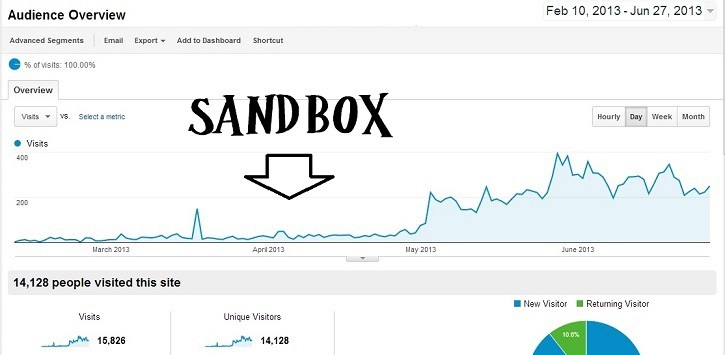Is Google’s sandbox a myth or a reality?
The term “sandbox” first appeared in 2004 in a discussion between webmasters on a forum.
Back then, webmasters were already noticing sudden drops in the rankings of their content as well as difficulties in appearing at the top of Google’s rankings with brand new websites.
They quickly found that their sites’ URLs continued to be indexed by the search engine, but they were not ranking as expected – especially for their target keywords.
Over time, they also noticed that it took longer to achieve high rankings on Google, especially on the first page, with brand new content. This time was estimated at a few weeks at best and could sometimes take up to several months.
Was it the effect of a new filter applied by Google when indexing new web content, or a change in Google’s algorithm?
Even though there are both supporters and detractors of the existence of a so-called “sandbox”, the issue still exists today.
As for Google, when they were asked about the sandbox, they answered, of course, how can we put it… as they answered every question about their algorithm: they denied everything!
There is no sandbox.
— 🍌 John 🍌 (@JohnMu) August 19, 2019
But it remains a reality. Since 2004, webmasters have been observing the same things over and over again.
Newly created sites seem to be penalized, just like are older sites that over-optimized their content.
And this is seen only on Google. It hasn’t been observed in ranking on other search engines.
So is Google’s sandbox a myth or a reality?
Whether or not this concept really exists on the most important search engine on the market, results talk by themselves. But there are ways to counter them.
Do you think that your website is in the sandbox ?
The term sandbox is commonly used to describe a certain list of things affecting new websites.
However, these effects are totally different from those observed on a website that was “blacklisted” or penalized by Google.
When a site is blacklisted, it is no longer indexed by Google: neither its URL nor any of its pages appear in Google search results.
But a website in the sandbox is different: whether it’s brand new or older, it is indexed by Google and show up in search results, but it’s not ranked high on the SERPs.
To check if your website has been penalized, is not indexed, or is in the sandbox, enter the URL of your site in the search engine or type “site:thenameofyourwebsite.com”.
If URLs of your website show up in the results, it means it is indexed and it’s not blacklisted.
And for new websites, it might take a few days or weeks to be indexed, so be patient.
Once you’ve done that, check if you observe any of the following things:
- If your site’s home page contains a title tag, type it in quotation marks in Google. If you can see it, but it doesn’t appear in the first results, you might be in the sandbox.
- Repeat it for several other pages of your website, repeat the same test with different title tags to see if Google indexed any of them. If they do, but they don’t rank high, again, you might be in the sandbox.
- For these same pages, collect the main keywords they contain and search for them on Google by separating them with commas: if these pages don’t appear at the top of Google’s results, you might be in the sandbox.
- Your ranking for a given keyword has suddenly dropped; use “allinanchor:your-keywords” and check if your site is indexed correctly. If the website page appears but is not showing in the top rankings, it might be in the sandbox.
- You can do the same search with the following operators: “allintitle”, “allintex” and “allinurl”.
If the answer is yes for one or many of these tests, you are likely a victim of what many webmasters consider to be a penalty introduced by Google.
If the sandbox exists, your site has certainly been placed there. And its effects will continue to be felt for many, many months if you do not take any action.
What can put you in the sandbox ?
Discussions between SEO specialists and webmasters have shown that recent sites must first prove they are trustworthy to Google.
As for older sites that may have been put in the sandbox, it could be because of recent changes made to Google search engine that consider new criteria to rank websites.
For the most recent sites, some SEO specialists talk about the 13-month rule: Google would only give a website the rankings it deserves at the end of the twelfth month of existence.
We’re not sure about when this 13 months period starts, but it might be measured from the date the domain name was registered. Others think that Google is using the renewal date of the hosting subscription. In both cases, this 12 month trial period would indeed, in a way, be an effective method to evaluate the trustworthiness of a site.
For older sites, though, it seems that Google allows itself a little time to validate the relevance and quality of a site’s new content that could be over-optimized for SEO. It could also happen when the keywords a page targets enter a “sensitive” topic (see Your Money Your Life content).
Google then takes the time to check the quality of the content before ranking it against content that it already trusts.
Finally, building backlinks that help index and rank a site or its pages is also taken into account by Google and is quickly penalized when used in excess.
How to get out of the sandbox faster ?
But the good news is, there are ways to get out of the sandbox faster.
Again, the sandbox may or may not exist, and Google says it doesn’t, but the effects are real, and you can reduce them.
For a new site, it will first be necessary to be patient and take care of the content.
Don’t over-optimize the content, avoid keyword stuffing, and update the content often to show Google that the website is alive and well.
Oh, and go easy on backlinks.
A brand new website that received too many backlinks, too quickly, will be considered suspicious by Google.
The best solution is to publish new articles frequently on websites related to yours, with a link to your website. In other words, keep guest posting regularly but don’t overdo it.
It will help reduce the time it takes for new content on your website to get indexed.
As for older sites whose pages suddenly lost rankings on their main keywords, it is recommended to update the content and see if it recovers before building new backlinks to try to get those rankings back.
SEO and organic rankings are the best way to get people to find your website.
The idea here is to optimize your pages’ content enough to reassure Google that your content is useful to its users and relevant for the query, but not too much to avoid looking spammy.
So keep optimizing your content and build backlinks, but do it slower.
Finally, if you have built too many backlinks, and some might not be too relevant, ask the webmasters to remove them or update the content, so it looks more natural.
These few tips will help you to get better rankings on Google for keywords important to your business.
And if you’re unsure how to do it or improve your rankings on Google, contact us today to talk with our SEO experts.


